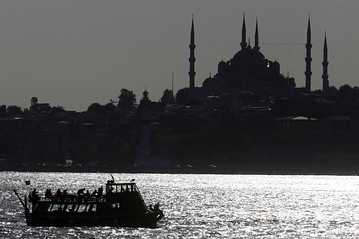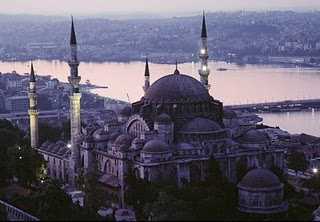When my wife Diane and I arrived in Istanbul on May 12—the sixth stop on our multi-country adventure—we were under no illusion that Turkey was a democratic paradise. Still, the clampdown to take effect on August 22 was ominous. On that date, the religious conservative Justice and Democratic Party plans to require all Turkish computer users to choose among four Internet filters–family, children, domestic or standard–if they wish to gain online access.
Related Content
Turkey’s Transformation: On Islam, Nationalism and Modernity
Millions March for Labor Rights
Mummies and Models in the New Middle East
Iran Talks Not Over, Says Ahmadinejad
Languaging
About the Author
Richard Pollak
Richard Pollak is a contributing editor at The Nation and the author of, among other books, The Creation of Dr. B: A…
Also by The Author
[ Click for More ]
Homeless in Hollywood (Poverty, Society)
On the night of the 83rd Academy Awards, 82,000 people will be sleeping on the streets of Los Angeles, the nation’s epicenter of homelessness.
Richard Pollak
7 comments
A Confederacy of Foxes (Media Analysis)
The mainstream media track Fox News as if it were the Sixth Estate. Does that benefit us—or Fox?
Richard Pollak
Related Topics
Ahmet Sik Istanbul Social Issues Technology War
The authorities also have given Internet service providers and website hosts a list of 138 keywords that are off-limits. Most seem arbitrary, if not absurd: yasak, which means forbidden, is forbidden. Also yasak are etek (skirt), baldiz (sister-in-law) and hayvan (animals). Less benign words on the list are free and pic, which minimize the appearance of photographs and most references to freedom that might displease the Muslim-dominated Justice and Development Party (AKP), which has become increasingly authoritarian since coming to power in 2003.
On May 15, we took a tram and funicular to Istanbul’s historic Taksim Square, site of a monument to modern Turkey’s founder, Mustafa Kamel Ataturk, whose secular legacy the AKP works to undermine. Two ambulances stood by, as did more than a dozen policemen, some armed with automatic weapons. We assumed they were on guard because the square has long been a magnet for political protests, and also was the site of a suicide bombing last October, which the government linked to Kurdish dissidents, and which left more than thirty people wounded, half of them policemen.
But all was serene on this Sunday morning, as men (there were virtually no women) lazed on the benches or walked their dogs among the plots of flowers. We gave a rubbernecker shrug, left the scene, and took a long, leisurely stroll down the neighborhood’s car-free Istiklal Street.
By late afternoon, both the square and the popular shopping promenade had filled with demonstrators, many carrying placards and shouting, “The Internet is ours and will remain ours.” Thousands more repeated the protest in some 30 other cities around the country, with an estimated one million weighing in online.
It doubtless did not escape the AKP’s notice that the large turnout was organized and coordinated over social networks like Facebook, a fact likely to harden Ankara’s determination to crack down on internet freedom. Already, security officials block some 7,000 websites, according to Reporters Without Borders (RWB), which has called on the government to jettison the keyword list and lift the August 22 filtering decree.
RWB reports that references to Ataturk, “the armed forces, the Turkish nation, minorities (especially the Kurds), or so-called ‘terrorist’ organizations” are key targets for online censorship. So is even suggesting that the Turks of the Ottoman Empire committed genocide in killing more than a million Armenians during and just after World War I.
Treading in these and other areas that the government finds sensitive has gotten the print, radio and TV media in trouble for years. According to the Organization for Security and Cooperation in Europe (OSCE), 57 Turkish journalists are currently in prison for crossing one arbitrary line or another, more than in any other nation. In March alone, the government arrested at least a half-dozen Turkish journalists, among them Ahmet Sik, an investigative reporter jailed for allegedly accusing the Gulen Movement, an influential Muslim organization, of infiltrating the security forces.
Three weeks after Sik’s incarceration, Istanbul police raided the office of his lawyer, as well as the publishing house Ithaki and the newspaper Radikal. They copied and then destroyed computer files containing the draft manuscript of The Army of Imam, the book in which Sik reportedly makes his Gulen charge. His book apparently also reveals other information embarrassing to the AKP and its conservative and charismatic prime minister, Recep Tayyip Erdogan.
Erdogan dismisses claims that he is stifling dissent, a ritual denial rolled out in part to buttress what one critic calls Turkey’s “fake democracy,” in part because on June 12 the nation votes in parliamentary elections and he needs a majority of AKP seats to stay in power, and in part because the European Union, into which Turkey has long sought entrance, frowns on media censorship.
The facts behind Erdogan’s not-us noises are these: Turkish authorities can imprison journalists for up to three years before trial, one journalist has received a sentence of 166 years, and the longest sentence sought by prosecutors is 3,000 years. These and many other draconian measures have cowed most Turkish media into a self-censoring servility, not least because many convicted reporters and editors wind up in high-security prisons alongside hardened criminals. (The Istanbul International Independent Media Forum offers further details on Turkey’s media repression here.)
These journalists are in prison for doing pretty much what I’m doing here, and have done with impunity all my professional life: reporting what seems to be news, or at least interesting, and occasionally setting down opinions, sometimes strong ones. When I imagined what punishing conditions these Turks face for just doing their jobs, indulging in tourism required a willful suspension of belief. So, as we so often do, I stashed my moral compass where I couldn’t see the needle swing toward Complacency, and ventured into the many attractions of Istanbul. To read more about what Diane and I saw, check out my blog.
Richard Pollak




